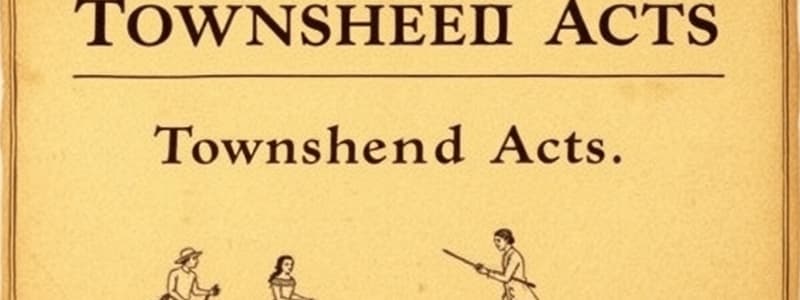Podcast
Questions and Answers
Who was known as 'Champagne Charlie'?
Who was known as 'Champagne Charlie'?
- Lord North
- Samuel Adams
- Charles Townshend (correct)
- Governor of Massachusetts
The Townshend Acts placed a tax only on tea imported into the colonies.
The Townshend Acts placed a tax only on tea imported into the colonies.
False (B)
Who led the opposition to the Townshend Acts?
Who led the opposition to the Townshend Acts?
Samuel Adams
Lord North was known for taking ______ in Parliament.
Lord North was known for taking ______ in Parliament.
What was the purpose of the boycott initiated by the colonies against British goods?
What was the purpose of the boycott initiated by the colonies against British goods?
Women played a significant role in the boycott of British goods.
Women played a significant role in the boycott of British goods.
What was one of the ways women helped in the boycott?
What was one of the ways women helped in the boycott?
Townshend shouted in Parliament, 'I will, I ______!'
Townshend shouted in Parliament, 'I will, I ______!'
Match the figures with their corresponding descriptions:
Match the figures with their corresponding descriptions:
What items were subject to taxation under the Townshend Acts?
What items were subject to taxation under the Townshend Acts?
Flashcards are hidden until you start studying
Study Notes
Charles Townshend and the Townshend Acts
- Charles Townshend, known as "Champagne Charlie" because of his love for champagne, believed colonists needed an army to maintain order.
- Upon being questioned on making colonists pay for that army, he confidently declared "I will, I will!".
- Townshend enacted the Townshend Acts in 1767, imposing taxes (duties) on goods imported from Britain.
- The acts targeted popular items like glass, paint, paper, and tea.
Colonial Response to the Townshend Acts
- Colonists viewed the Townshend Acts as an infringement on their rights and were determined to oppose the taxes.
- Samuel Adams, known for his powerful speeches and writing, led the opposition to the acts.
- Adams' writings were so impactful that they stirred emotions and opposition among colonial leaders.
- He argued that the duties violated colonists' rights as British citizens.
- Colonists collectively responded by boycotting British goods beginning in 1767.
- Women played a crucial role in the boycott, taking the lead in avoiding British imports.
- This peaceful form of protest even gained support from some Loyalists.
Repeal of the Townshend Acts
- Lord North replaced Townshend as the head of the British government.
- He realized that the Townshend duties were financially detrimental due to the boycott, causing a substantial loss in revenue for British merchants.
- In 1770, North persuaded Parliament to repeal all Townshend Acts duties except for the tax on tea.
- King George III, despite Parliament's concerns, insisted on maintaining the tax on tea, arguing for the right to tax Americans.
Studying That Suits You
Use AI to generate personalized quizzes and flashcards to suit your learning preferences.




